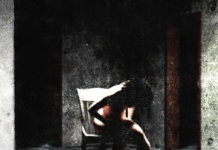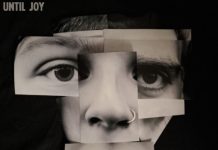Nightsong is a project, or perhaps better described as a collaboration. The artists are John Reed – well known to us here at LSF as a cittern playing folkish singer/songwriter, producer/musician Ali Karim Esmaiil and songwriter/musician/producer Jo Beth Young – Talitha/RISE /Yates and Young. This is their second release – the first being ‘Pauper’s Son’ – and there will be an album – ‘The Peasants’ Revolt’ – released at the end of the year.
The trio describe their sound as prog-folk, and perhaps this needs further explanation. I think it’s probably better to use the term progressive folk; a sound that is at its base folk but includes contemporary sounds and has bang up to date production. It is folk that has progressed, taking in elements of other music.
‘The Spell’ is mesmirising from the opening – gentle plucked cittern, Jo Beth’s vocals are spell-binding. And it gradually builds adding layers of sound, layers of voices, a sparse but incredibly effective beat. There is a Celtic feel to the song as it builds. And for those of you who are reaching for ‘then this must sound like Enya’ you’d be wrong, so wrong. Personally I get hints of Kate Bush, things that remind me of later years Fleetwood Mac. But the thing that I am left with is that this song is all about evoking an atmosphere, an atmosphere over which a story unfolds.
The song is inspired by the witch hunts and trials of East Scotland, imagining a persecuted ancestor speaking through the mists of time. And this makes for a song where the words compel repeated listening.
Jo Beth says ‘This song has asked me to dig into my own ancestry which includes my Dad’s family line on the East Coast and Borders of Scotland. Some years ago I found out that a few young women from Selkirk had been charged with witchcraft. I have always had a great interest in that era, and the song is an acceptance that even if we kill someone that has an idea we don’t agree with, the idea will continue in another person and carry on. We don’t end the idea by ending the person. When I later discovered the story of Issobel Young who is very likely an ancestor, I was amazed to see in her trial notes she owned some objects that I own today and had practices in her life similar to mine. I didn’t know about Issobel’s story when I wrote the song so it seemed eery to have written the line “I’ll keep coming back, I’ll keep coming back”’,
There is perhaps a risk that with such a weighty subject it could have become overly complex lyrically but the approach used, that of a person telling their story, makes it direct and emotionally effective.
Musically there is the risk of making it ‘too witchy’ – and there is a hint of ‘witchy’ – but the music supports the vocals by being simple. I admit that this may be simple complexity because it’s all about layers of voices and sounds laid on top of each other, weaving around each other. But the end result doesn’t sound complex or over-produced, it’s all about mood and feel, it has just enough to do what it needs to do and no more. A kind of sparse complexity if you will.
There are songs where music, voices and words combine into something special, and ‘The Spell’ is one of those. It’s beautiful, atmospheric and – appropriately – casts a spell over you.
The info
The trio have been recording from a distance during lockdown in both the studio in the UK and the corners of Irish cottages.
The atmospheric music video was filmed by Jo Beth in the West of Ireland and includes imagery of Athenry Dominican Abbey and the surrounding nature.
The tale behind the song
Scotland carried out five times more executions for witchcraft than the European average. Estimates vary but it is thought that between 3,000 and 5,000 people (mainly women) lost their lives following accusations of witchcraft in the 16th and 17th centuries. The population of Scotland at that time was about 800,000. If the same fate befell half of one per cent of the current Scottish population today, it would mean around 26,000 executions across the land. The scale was horrendous.
One of Jo Beth’s ancestors, Issobel Young, suffered death by strangulation and burning after her husband accused her of “attempting to kill him with magic after quarrelling about an unsavoury house guest.” Interestingly, this nugget of information was discovered only after Jo Beth had written this song. Sometimes past spirits seem to beckon their descendants to reveal their stories. Is this a song that rights a wrong?
The upcoming album – ‘The Peasants’ Revolt’ – blends urban, folk, and progressive folk music, lifting the lid on the ordinary lives of English (and sometimes Scottish) medieval peasantry and highlights curious parallels with life in 2020. A release date will be announced soon with an approximate date of December this year.
Nightsong on Bandcamp: https://nightsong.bandcamp.com







